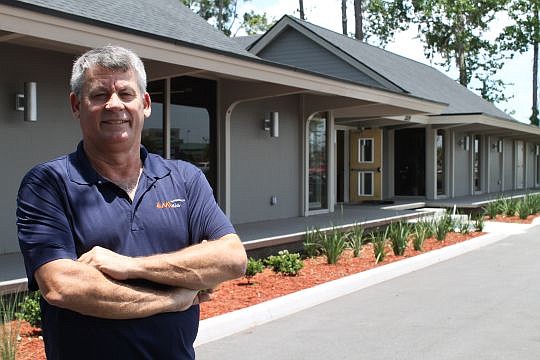
Mike Dulin started working for AMIkids as a diving instructor 32 years ago because it looked like a better gig than the one he had diving for the oil industry.
Today he sees the huge difference his work has made.
“I’ve had kids come back five years later and say, ‘I’m married, I’ve got two kids, I’m working for so-and-so,’ or ‘I’ve got my own business, I just wanted to thank you for what you did to help me.’ The more of that you get, the more you want to stay,” said Dulin, the executive director for AMIkids in Jacksonville, formerly the Jacksonville Marine Institute.
AMIkids is a program for troubled teens –– kids who’ve either had run-ins with juvenile justice or who’ve been referred by their schools for poor behavior.
The program motivates students by rewarding them with things they want to do –– learning diving, boating, art or auto mechanics –– in exchange for good behavior and school performance. They also receive individualized education and counseling.
In 1982, Dulin wasn’t thinking about troubled teens, he was thinking about a career move.
For more than three years, he had been diving and drilling at offshore oil rigs in the Gulf, a job that forced him to travel out of town a lot and put his life in danger more than once.
At a friend’s suggestion, he took a diving instructor job with AMIkids, because it sounded safer.
It’s work that not everyone is cut out to do, though.
Some can’t handle the stress, Dulin said, or don’t like having kids curse at them, or become heartbroken at seeing them backslide after months of progress.
“It’s a really tough job, because you can’t just fix it,” Dulin said. “You can’t just put a new behavior in there. It’s constant work.”
For Dulin though, he ascended from instructor to eventually become an executive director. He also served a stint as a regional director, overseeing 12 schools in four states. Five years ago he returned to be executive director at the Jacksonville office.
The biggest difference between AMIkids and a juvenile detention center is its attempt to engage students with activities they like to do and change behavior through a system of “instant rewards and instant discipline,” Dulin said.
“If they’re warehoused somewhere, just serving time, you’re not making a change,” Dulin said. “You’re not changing their behavior, their thoughts or ideas.”
In the case of diving instruction, for example, kids need to read a book to learn the program. They have to do math to work the dive tables, which tell how long one can stay under water at a certain depth.
“Getting a paper diploma to hang on the wall means nothing to these kids,” Dulin said. “But if they get to go diving –– kids want to do that.”
The discipline of making the right choices to achieve goals develops into a habit over time, Dulin said.
Teaching diving is the tool Dulin initially uses to get kids’ attention. Others follow.
“My main tool is listening and talking –– in that order. Once the kids have figured out that you will listen to them, and you’re fair, you’ve got them,” he said.
Virtually all of the students in the AMIkids program have experienced some kind of life trauma, Dulin said — a dad who’s gone to prison or a brother who’s been shot.
Many have had to fend for themselves when parents had multiple jobs and no time to pay attention.
The combination of immature minds and stressful lives causes kids to make poor decisions that seem right in the moment.
Dulin said when children get attention, opportunities and a place where life is fair, they
open up.
“I found out pretty quick, they have that tough exterior because they needed to survive,” Dulin said. “I learned a lot of our kids are really good kids. They just haven’t had direction, they’ve had a really tough life, and they’ve been trying to figure this thing out on their own.”
(904) 356-2466